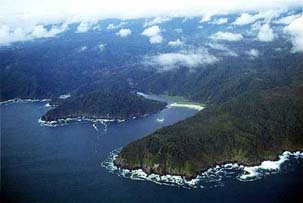

| The Coastal Range Coalition |  |
| Text: Coalición | Photo: Coalición |
- The Coastal Range Coalition
- Biodiversity
- Cultural diversity
- History of temperate rainforest
- Threats to the rainforest
- Tourism
The rate of destruction of native forests is one of the major conservation problems in Chile. The main causes of this process are the conversion of native forests to pine plantations and logging for the production of woodchips, firewood, sawn wood, and veneers. Other causes include human-set forest fires and conversion to agricultural land. An additional problem is that important ecosystems and species are absent from, or are poorly represented in. The National System of Protected Areas (SNASPE). Therefore, urgent changes in forest conservation and management policies are required. These changes should promote a balanced development of forestry based both on tree plantations and managed native forests. We recommend the following State policies: 1) promoting the sustainable management of native forests y means of subsidies, training, technical assistance, and research; 2) supporting the expansion of the SNASPE; and 3) enforcing environmental laws. Such actions should lead to a reduction of the environmental and social impacts of the destruction of native forests, as well as to improve the quality of life of the local population. The recent debate over the use of native forests reveals the need to promote the participation of the different social actors involved (Government representatives, timber companies, conservationist groups, small land owners, scientists, and workers) in the negotiations. This would facilitate reaching agreements over key issues.
|
|
 |
Hidden within the still remote ranges of the Pacific Coast of Southern Chile is one of the most diverse forests in the Americas. This coastal remnant of the once expansive Valdvian Rainforest contains outstanding biodiversity and extremely high levels of endemism. The endemism is attributable to the history of the coastal range as a forest refuge surviving mulitiple Andean glaciations and volcanic disturbances. Coastal Valdivian Rainforest species can be traced back to the Tertiary period (7 to 11 million years ago) and to the ancient Gondwana continent (around 160 million years ago). This is one of the last frontier temperate rainforests in the world, and it has been recognized by the World Wide Fund for Nature as part of the 25 highest priority conservation areas on the planet.
The
Coastal Range Coalition objectives are:
|
At the beginning of June 2001, even after receiving thousands of letters from concerned Chileans and international conservation organizations encouraging the relocation of the highway in already roaded forest areas, the Chilean Ministry of Public Works (Ministerio de Obras Publicas) decided to continue the construction of the Southern Coastal Highway (Ruta Costera Sur) which will facilitate the logging and conversion to exotic plantations of this globally important forest.
The Coastal
Range Coalition (Coalición para la Conservación de la Cordillera
de la Costa) is a collection of environmental and sustainable development
organizations based in the Lakes Region of Southern Chile. The Coalition
was formed with the intention of designing conservation strategies for
the coastal subregion and confronting megaprojects such as this proposed
highway. Amongst these organizations is the Council of the Caciques
of the Butahuillimapu, an organization of the leaders of the indigenous
Huilliche communities of the Coastal Range. These communities were
neither informed nor consulted about the construction of the highway.
Currently the Council is working to obtain legal recognition and title
over their ancestoral lands, as well as promote sustainable community development
and management of their natural resources.
The Coastal
Range Coalition needs your help to stop the construction of this Coastal
Highway and promote the design of conservation and economic planning
that insures the long term protection of the rainforest and sustainable
economic development for the region. Write letters to Chilean President
Ricardo Lagos (La Moneda, Santiago de Chile or e-mail: sperez@presidencia.cl
or psilva@presidencia.cl) and ask that the concerns of the Huilliche people
be heard and that the road be relocated away from the coast. For
more information contact the Coalición para la Conservación
de la Cordillera de la Costa (coalicioncc@terra.cl).